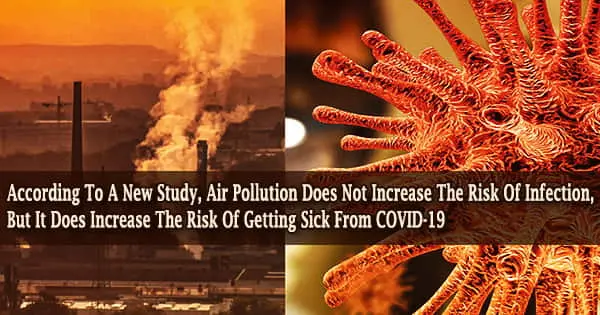A study led by the Barcelona Institute of Global Health (ISGlobal), a center supported by the “la Caixa” Foundation, and co-led by the GCAT| Genomes for Life-Germans Trias I Pujol Research Institute (IGTP), Badalona, found that long-term exposure to air pollution is linked to a higher risk of developing COVID-19 among those who become infected.
The study, which was published in the journal Environment Health Perspectives, adds to the growing body of evidence supporting the health advantages of lowering air pollution. According to a number of studies, localities with greater levels of pre-pandemic air pollution had a higher prevalence of COVID-19 cases and deaths.
However, the causes for these relationships are unknown; air pollution could enhance virus airborne transmission or raise a person’s susceptibility to infection or sickness.
“The problem is that previous studies were based on reported cases, which had been diagnosed, but missed all the asymptomatic or undiagnosed cases,” says Manolis Kogevinas, ISGlobal researcher and first author of the study.
The research team opted to combine Carlota Dobao’s method for measuring a series of virus-specific antibodies in a cohort of adults living in Catalonia (the COVICAT cohort) with data on such individuals’ long-term exposure to air pollution (NO2, PM2.5, black carbon, and ozone).
This is the first study to perform mass screening of SARS-CoV-2 specific antibodies in an adult cohort to examine the association between their residential exposure to air pollution before the pandemic, SARS-CoV-2 infection, and disease.
Cathryn Tonne
“This is the first study to perform mass screening of SARS-CoV-2 specific antibodies in an adult cohort to examine the association between their residential exposure to air pollution before the pandemic, SARS-CoV-2 infection, and disease,” says Cathryn Tonne, cosenior author of the study together with Dobaño.
Higher viral burden and/or symptom severity
There were 9,605 participants in the research, with 481 confirmed cases (5 percent ). Blood samples were also taken from over 4,000 participants to detect the presence and quantity of IgM, IgA, and IgG antibodies to five viral antigens.
Although 18% of those tested exhibited virus-specific antibodies, no link was established between illness and air pollution exposure.
However, a link was discovered between higher NO2 and PM2.5 exposure and higher levels of IgG specific for the five viral antigens (an indicator of higher viral burden and/or symptom severity) among individuals who were seropositive (i.e. were infected).
There was a link between increased NO2 and PM2.5 exposure and disease (symptoms) in the entire study population (the 9,605 participants), especially in severe instances that required hospitalization or intensive care. PM2.5 was found to be more closely linked to men over 60 years old and persons living in low-income neighborhoods.
Strongest evidence globally
“Our study provides the strongest evidence globally on the association of ambient air pollution and COVID-19,” says Kogevinas.
“These results are in line with the association between air pollution and hospitalization described for other respiratory diseases such as influenza or pneumonia.”
Air pollution may also have a role by promoting the development of cardiovascular, pulmonary, and other chronic diseases, all of which raise the chance of severe COVID-19.
“The combination of individual genetic risks that we have previously identified in COVICAT individuals and this new data on environmental impact caused by air pollution exposure will contribute to understanding the complex interplay and mechanisms underlying the severity of COVID-19,” says Rafael de Cid, from the IGTP.
The authors conclude that the findings support the public health advantages of decreasing air pollution levels and emphasize the role of environmental factors in infectious illness transmission.





